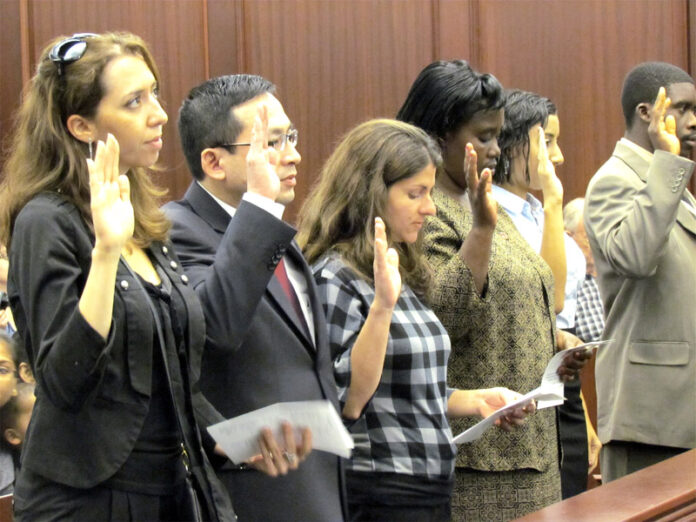
Among the 45 soon-to-be U.S. citizens gathered last Friday was 28-year-old Iranian born Sepideh Bigdeli. She is a student at Virginia Tech studying for her Masters Degree in Architecture.
Having lived in the United States for almost nine years, Bigdeli “came to realization that many people take things for granted in this country. Things that may seem so trivial for people in America are challenges for people in another country. I truly appreciate the opportunities provided for me in this country and hope that I can be a better person every day,” she said.
At the Poff Federal Building Friday, 45 people waited patiently to take their oath of allegiance and receive their naturalization certificate. Judge Samuel Wilson, the federal judge for the United States District Court for the Western District of Virginia officiated. Tim Heaphy, the U.S. Attorney for the Western District of Virginia, called out their names one by one. Heaphy struggled at times with the diverse names on his list. He came across one whose name was “Smith” and gave an audible sigh to chuckles from those assembled.
U.S. Senator Mark Warner was there to greet each new citizen as they were handed their citizenship certificate. He later painted a somewhat “messy” picture of the U.S. form of government.
War was part of Bigdeli’s childhood in Iran. She was born and raised during the Iran-Iraq war. “It was not pleasant growing up as a kid faced with such crisis,” she said. Her parents did their best to keep her and her brother safe.
She still remembers being awakened in the middle of the night in her mother’s arms sitting in a staircase, praying to God to keep them safe from Saddam’s bombs. Other times her older brother struggled to keep up with his schoolwork when classes were canceled.
“It did not matter if you were poor or wealthy. There was little produce in the stores to purchase. It was difficult to obtain even the basics for living such as gas, milk and bread,” she said.
Bigdeli’s parents struggled with their decision to move to the United States since their roots were in Iran. During their first stay in the United States, her older brother was born here. They moved back and forth several times – once when she was three and another time when she was fifteen. At 15 she went to an American school for the first time and recounted the difficulty she had communicating with other children.
Her English improved significantly, but her parents again went back to Iran. Her older brother later moved permanently to the U.S. He was already a natural-born citizen and at age 21 applied for a green card for his parents. Bigdeli was the last person in the family living outside of the U.S. She became a candidate for a V-Visa.
A V-Visa is available to minor children of U.S. lawful permanent residents and is meant to achieve family unity. At age 19 she left college in Iran for permanent residence in the U.S. This time there was no going back and it was tough for her not having permission to work.
Bigdeli started college all over again at San Jose State University where she studied interior architecture and photography. It took two years to obtain her permanent residency card. She then tutored English language students and worked retail. “All throughout my undergraduate work I was a Dean Scholar and received scholarships,” she said.
After working for an architectural firm in San Jose, she realized she wanted to pursue architecture. Among the schools she applied to “Virginia Tech was the best suited for me … they had the best architecture school in the nation,” she said.
The three-year program at Tech opened up a lot of opportunities for Bigdeli. She has traveled to Europe on residency programs offered by the architecture department.
Speaking for herself she said, “the limitations that we faced in Iran as women made us work harder and more purposefully. In fact, female college attendance in Iran has surpassed that of males in the past few years. This is a great example of how women are striving to improve their lives as individual human beings.”
Bigdeli was humble in the telling of her abridged life’s story and did not linger on “the struggles and shortcomings I had as an immigrant” as she put it. “It may just show how I have used some of the resources provided for me in this country while not all Americans are taking advantage of these resources,” she said.

